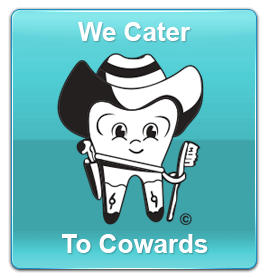Other Services
Dentures & Partials
Dentures & Partials
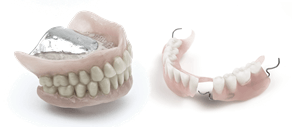
Dentures are another way we can replace missing teeth. Unlike implants or fixed bridges, dentures are a removable alternative. If you are missing all of your teeth, we can make you a set of complete dentures, which is a full set of replacement teeth. If you still have a few good teeth left, then we can make some partial dentures, which are made to fit with and be supported by the natural teeth you still have.
Who Needs Dentures?
Contrary to popular opinion, dentures are not just for the elderly. Patients of any age may lose some or all of their teeth due to an accident, illness, decay, etc. and may require a denture of some sort. Since teeth are so important to good health and appearances, a good set of custom dentures can be a great solution for tooth loss.
What Is Involved In Getting Dentures?
The denture development process takes a few weeks and several appointments.
First, we make a series of impressions of your jaw and take measurements of how your jaws relate to one another and how much space is between them. Next, we have our denture lab create models and wax forms in the exact shape and position of your denture that will be made. Then, you will “try in” this model several times and the denture will be assessed for color, shape, and fit before the final denture is made. After you have received your dentures, we can make some minor adjustments for fit and comfort, if necessary.
If you are having a new set of dentures made or your gums have healed from any previous extractions or surgeries, the whole process proceeds as described above. But if we need to extract most or all of your teeth and you don’t want to be without teeth for appearances sake, we can have a set of immediate dentures made in advance that can be put in place as soon as your teeth are removed. This way you don’t have to be without teeth during the healing period.
However, there is a down side to immediate dentures. Your bone and gums tend to shrink over time, especially during the healing period following tooth removal. There is a disadvantage of immediate dentures when compared with conventional dentures in that they require more adjustments to fit properly during the healing process and generally should only be considered a temporary solution until conventional dentures can be made.
What Are Implant Dentures?
If you need dentures or, unfortunately, have loose dentures, mini dental implants could provide the support necessary to create a strong stable denture fit! They are much smaller implants so they can be placed when there is less bone mass, which is very typical in seniors and anyone who has lost some or all of their natural teeth.
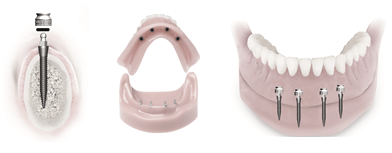
These mini implants are one piece with a “trailer hitch” ball on top that snaps into an O-ring female assembly that is embedded in your denture or partial. The implant technique is called “immediate placement and loading” whereby several mini implants are placed, with bone graft material if extractions were necessary.
By adding some artificial bone graft material to the sockets, we help the implants integrate with the surrounding bone and tissue to ultimately form a good dense bony base to support it. When you already have loose dentures and the implants are placed, your denture is immediately modified to accommodate the mini implants. You simply wear it home and follow the aftercare directions.
And with that you can throw away the denture adhesives, eliminate the fear of “denture drop” when speaking to your family and friends and start enjoying your favorite foods again! Research shows a good stable bite can add 10-20 years to your life!
Full Mouth Reconstruction
Sometimes people put off dental treatment a long time and “save up” a lot of dental problems: the most common being decay, periodontal (gum) disease, worn or cracked teeth and lots of missing teeth. This obviously requires more extensive work on our part, but, fear not, with today’s technologies we can reconstruct those teeth and restore your smile.
If you have enough good bone support, the roots of the teeth or dental implants can be crowned to a newer, more desirable chewing position. It may even look like instant orthodontics because the teeth are made to look straighter with the crowns, and a whiter brighter smile is very possible and usually desired. Reconstruction also lessens denture frown, that thing that happens to your face when all or most of your teeth are missing or are severely worn. This lets your jaws come too close together, giving you that “denture frown.”
The bottom line is a full mouth reconstruction gives you the opportunity to change just about everything you want to change about your teeth and smile! Although it is one of the most expensive services in dentistry, it is also one of the most life-changing!
Sedation Is Available
Let’s face it, sometimes there is anxiety at a dental office… and we KNOW that! So we have nitrous oxide/oxygen inhalation sedation available for you if you need or want it. It has a very safe track record and is actually recommended for our heart disease, stroke or dialysis patients. It gives the body extra oxygen (good during stress) and the nitrous oxide relaxes you — just enough to get cozily relaxed. Some say they feel like they had a glass of wine or they are relaxed and about to take a nap. if you want, we’ll even give you a fuzzy blanket!
One of the best things about this type of sedation is that its effects are so quickly and completely reversed that you can safely drive home from your appointment, many times feeling quite refreshed!
Complete Dental Exams
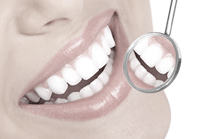
Oral health is virtually impossible without a complete dental examination. But what should it consist of? Probably the most important component is time — time with your dentist, time to get your health, drug, and dental histories and time to properly evaluate various conditions of oral health, disease and potential dental problems including:
Decay Removal Using A Laser
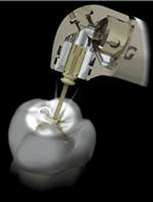
Heat, vibration and pressure are the primary causes of pain associated with the use of the traditional dental drill. For that reason, anesthesia is usually administered before proceeding with treatment.
But in our office, many times we have the option of removing decay with our Waterlase® laser equipment. Since the Waterlase® does not generate heat, vibration or pressure, many dental procedures can be performed with little or no anesthesia.
Also, we can remove the tooth decay more precisely without affecting the surrounding areas. This allows us to conserve more of your healthy tooth structure, thereby helping you keep your natural teeth longer.
Decay Removal Using Air Abrasion
Modern technology allows us to treat early decay with no anesthetic (“shot”) and no drill. As one of the first dental offices in the country to use air abrasion techniques, we have offered this technology to the people of Kingsville and the surrounding areas for over 15 years now. Everyone agrees that it’s a much more pleasant experience.
Large or deep cavities still require anesthetic and the drill, but if the cavities are caught early enough, we can avoid those hassles. The technology involves a tiny jet of compressed air and fine abrasive particles that effectively “blow away” the cavity like a powerful, focused, miniature sandblaster! We then place a tooth-colored filling that, many times, cannot even be seen. It involves more steps and uses more expensive materials than the “old way”, but most people agree that it’s worth the extra cost. I’ve even done it in my own mouth and believe me — IT’S BETTER!
This same air abrasion technology allows us to deliver a superior dental sealant by carefully cleaning the grooves of your tooth before the sealant application. Due to the better bonding that occurs, the sealant generally lasts longer.
Tooth-colored Fillings
For years now, cosmetic tooth-colored fillings have been very popular. They look better, chew great and last about as long as the old silver amalgam fillings, but did you know the silver ones are nearly 50% mercury? It is no surprise that many doctors and researchers think this is a problem and some European countries have even outlawed the use of silver amalgam, but not in the United States.
In fact, although we dentists are very strictly regulated as to the handling and disposal of mercury, our FDA recently reaffirmed the safety of silver amalgam. If you are interested, there are plenty of research sites on the internet where you can read and decide for yourself. Just Google “dental amalgam safety”, you will get several days of reading. Nonetheless, for over 20 years now, we have not used it in our clinic.
Dental Sealants
They literally “seal” and protect the natural grooves and pits of those teeth with no decay and no fillings. These pit and fissure areas are THE most common areas of decay in most mouths because bacteria often migrate down into the groove to set up their damage. A laser instrument can be used to “look” into these pits to make sure there is no decay. The grooves and pits are then cleaned with chemical and/or mechanical means, and a white or clear liquid composite (plastic) is flowed into them. When cured with a powerful fiber-optic light or laser, these sealants become a very strong barrier against food or decay-causing bacteria. And I have seen sealants last up to 20 years! 10 years is very common!
You may think they are only for children, but they are just as effective in adult mouths. With certain diet restrictions such as no ice chewing and no sticky candies, properly completed and cared-for sealants will give you many years of decay protection to those areas. And remember this: If we don’t have to fill a tooth the first time, it doesn’t seed the second or third filling, nor does it eventually need root canal treatment with a crown. We can stop this cycle before it starts by sealing teeth as soon as possible after eruption. For the money, these sealants are the best dental investment there is!
Dental Cleanings
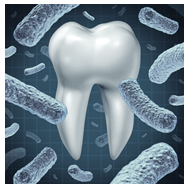
If regular brushing and flossing are your first line of defense, professional dental cleanings by a dentist or hygienist are a very important second line of defense against decay, tooth loss and extensive dental procedures. Plaque may develop on teeth in spite of your best efforts at good homecare and should be removed at least twice per year. This involves scaling and polishing as well as the use of various instruments or devices to loosen and remove deposits from the teeth. We also coach you on which homecare methods will best suite your oral hygiene needs.
FAQ About Dentures & Partials
Are all dentures the same?
When we hear the word “dentures”, most of us probably get a picture of the “false teeth” our grandparents used to put in a glass before going to sleep. Yes, dentures are simply a removable plastic teeth and gums, but dentures have come a long way and… NOT ALL DENTURES ARE CREATED EQUAL! In fact, making a great set of natural looking, comfortable and functional custom dentures is not an easy task. To do it properly and not cut any corners is one of the most difficult procedures in dentistry. High quality laboratory technicians plus high quality materials give you the best chance for success. Getting a denture is definitely a service where you get what you pay for!
Are there alternatives to dentures?
Dental implants are one alternative to dentures. They are artificial tooth roots that are surgically anchored into your jaw to hold a replacement tooth or bridge in place. Dental implants and fixed bridges can definitely resemble the feel of real teeth, but not all patients have sufficient bone structure to support them and, as such, are not good candidates for implants.
What do new dentures feel like?
New dentures may initially feel odd, sore or loose for a few weeks until the muscles of the tongue and cheeks learn to keep them in place.
Are dentures worn 24 hours a day?
We generally advise our patients to wear their denture almost constantly during the first few weeks – even while you sleep. Later on, we suggest you remove it at night and soak the denture in cleansing solution or water. Removing your denture for at least eight hours during either the day or night allows the gum tissue to rest and allows normal stimulation and cleansing by the tongue and saliva. This promotes better long-term health of the gums.
Will dentures make me look different?
Yes! If you have badly worn or no teeth, dentures will give you back that toothy smile you used to see in the mirror, as well as fill out a sunken face so common to those persons without teeth.
Since I have no natural teeth, do I still have to go to the dentist?
Yes, it is still important to continue your regular dental checkups. In addition to examining your oral tissues for sign of disease, we want to maintain the proper denture fit which changes as the bone under your denture shrinks or recedes with age.
Will eating with new dentures be difficult?
At first it will be very different, and there are some “tricks” we can coach you on so that your transition into dentures can be as smooth as possible. It helps to maintain a good attitude, applying the principles we show you , and like everything in life ,it seems, practice!
Should I use a denture adhesive?
Some people need these, some do not. Various powders and pastes are available at your favorite drugstore, and can be used anytime you want a little more secure hold. About 75% of denture wearers use adhesives full or part time.
